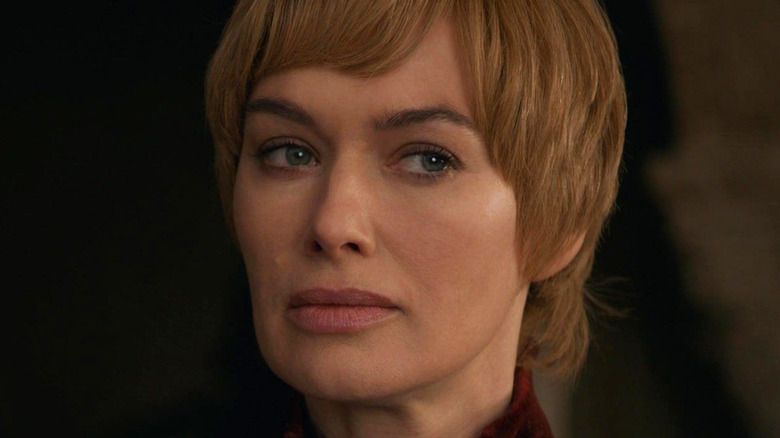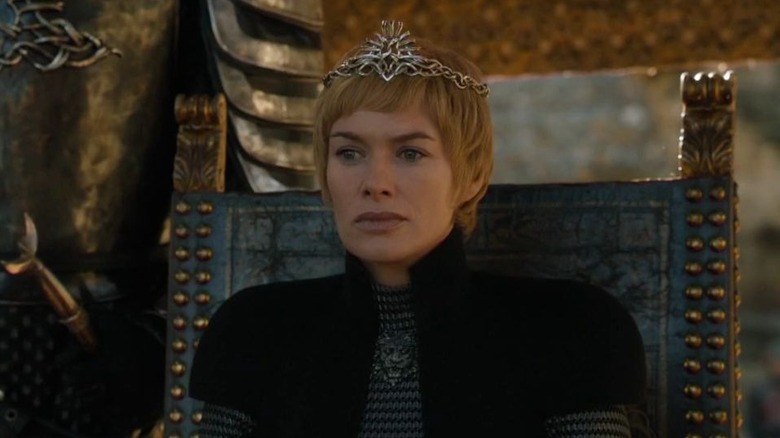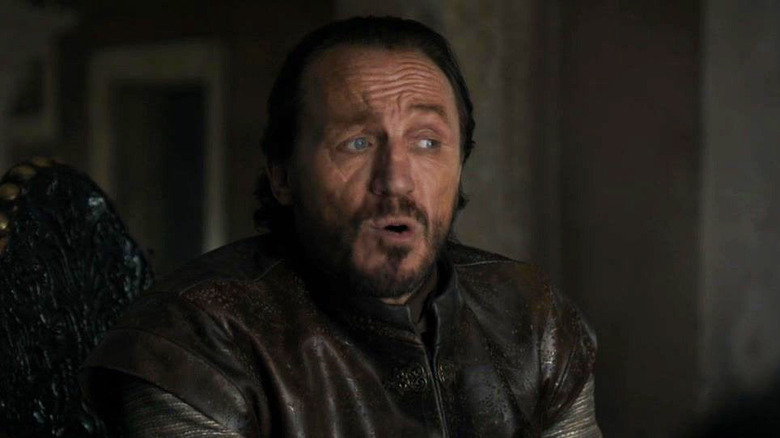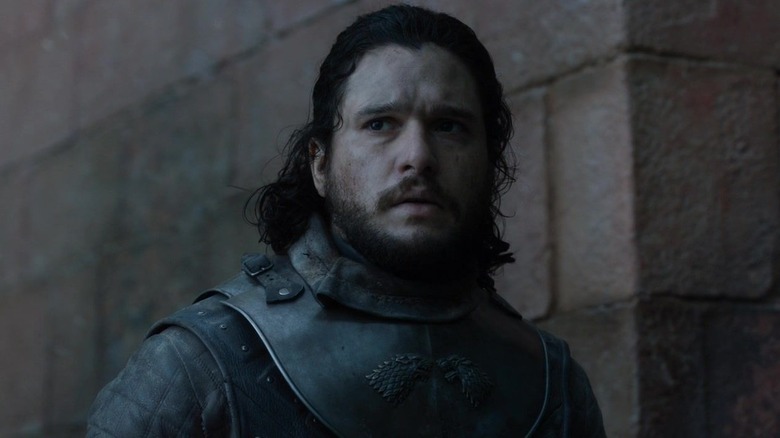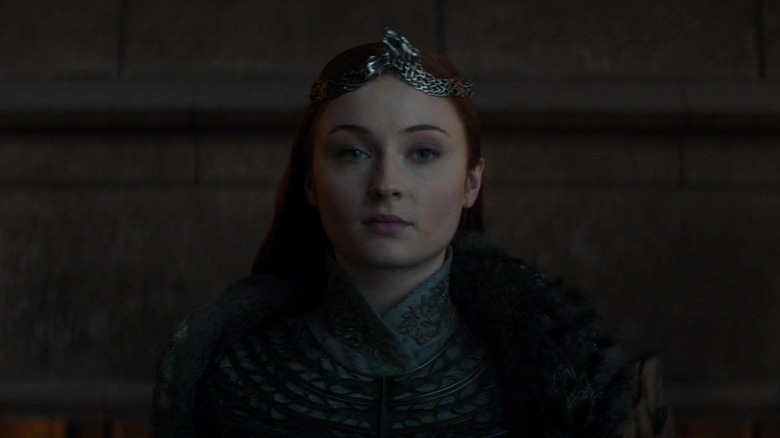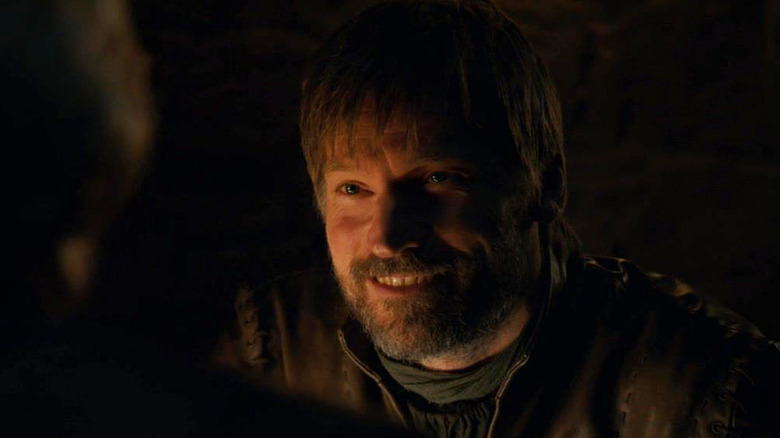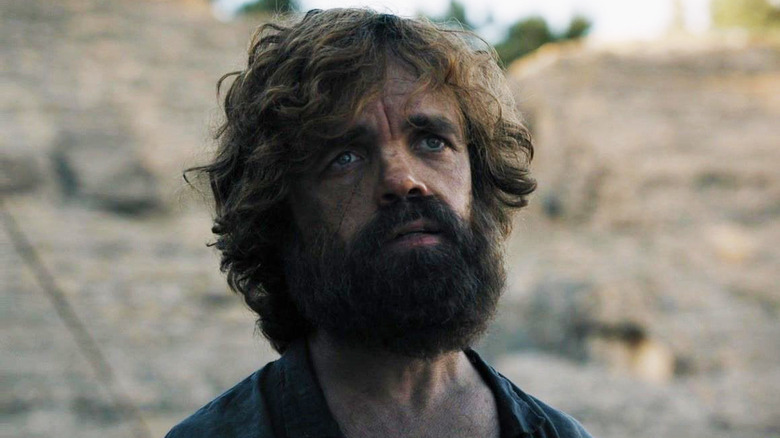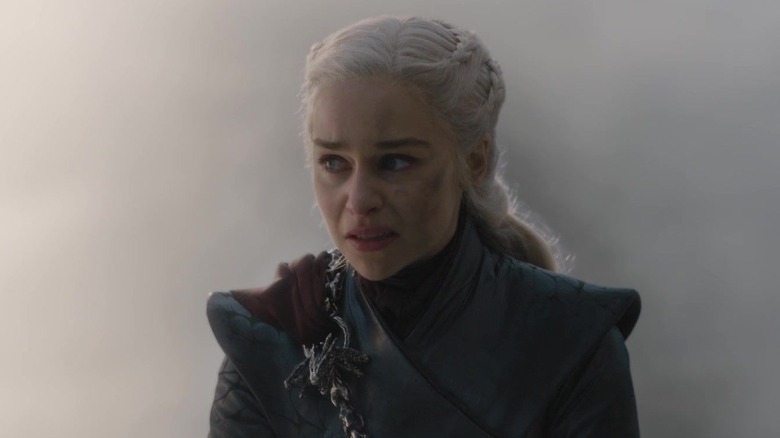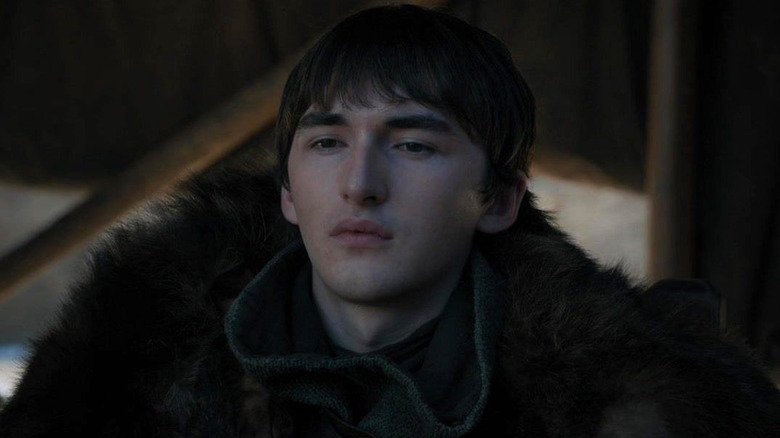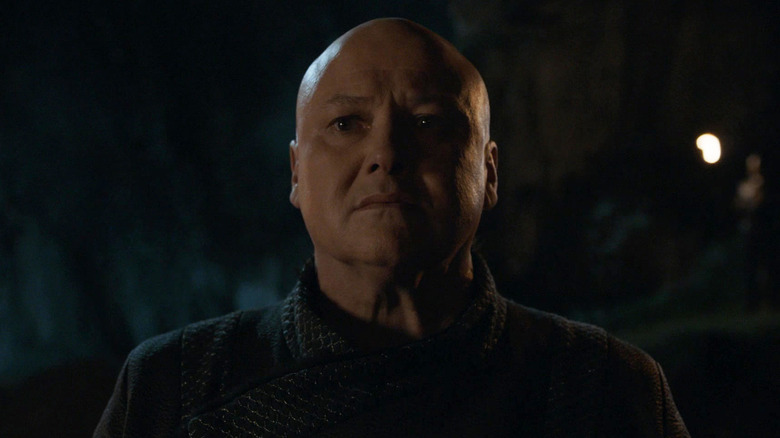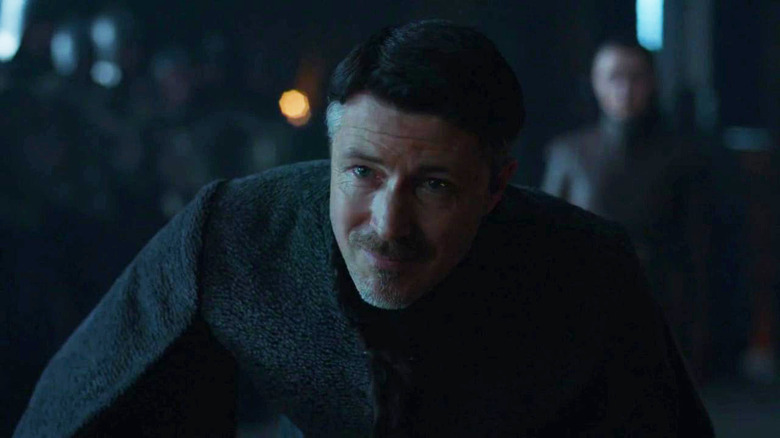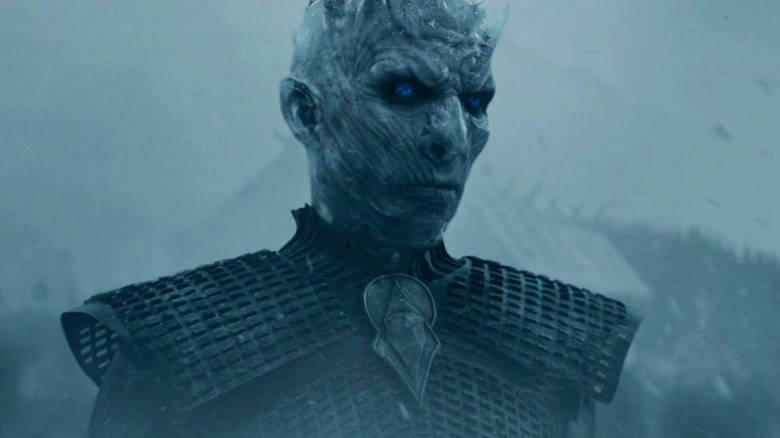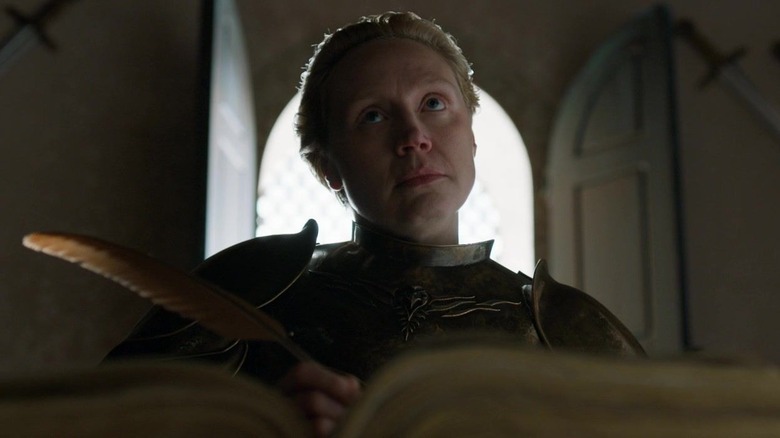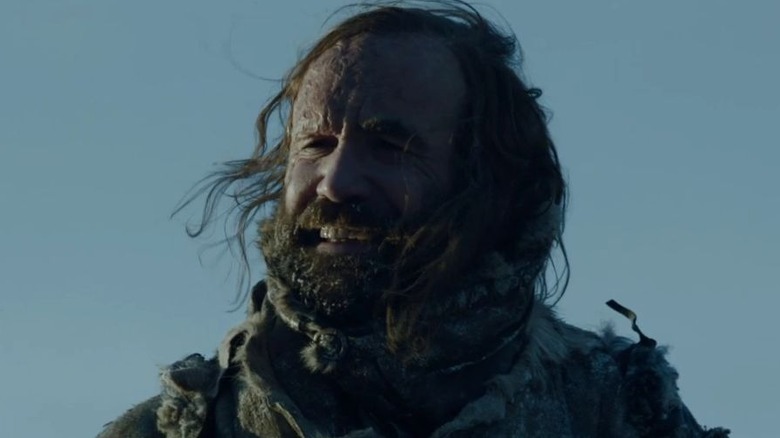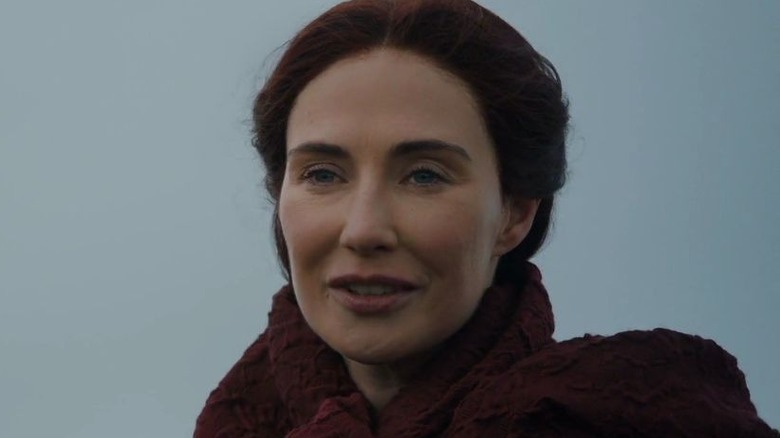Popular Game Of Thrones Characters We Wound Up Hating By The Show's End
"Game of Thrones" became one of the most popular shows on TV through its cast of colorful characters. The action sequences, mystical worldbuilding, and grand scenery shots are pretty great, of course, but when you think about why you love HBO's thrilling fantasy series, you probably picture particular faces. Where would this saga be without its scheming villains, tender-hearted outcasts, and fiery revolutionaries? Their journeys take them across kingdoms and continents as well as into the furthest reaches of the human heart. No wonder people started naming their kids Khaleesi and Arya, as The New York Times reported in 2019 — these fantasy figures are as vivid as any denizen of the real world.
But as all eight seasons of "Game of Thrones" unfurl, some of these beloved characters tumble from their pedestals. Motivations become convoluted, screen time is reduced, and plot twists necessitate odd choices. When the controversial final season hit the airwaves in 2019, many fans found, to their horror, that they actually loathed characters they once adored. Which widely-held favorites suffered the steepest declines? These are the popular "Game of Thrones" characters we ended up hating by the show's end, from bloodthirsty dragon queens to irritating mercenaries.
Cersei Lannister
Every popular character on "Game of Thrones" can be described as complex, but Cersei Lannister still manages to stand out as especially multifaceted. She is, simultaneously, a loving mother, bloodthirsty tyrant, victimized woman, and treacherous sister. Lena Headey makes portraying such a person look easy, but her talents are utterly squandered in the final two seasons of "Game of Thrones." Cersei goes from being the woman who orchestrates Robert Baratheon's death, blows up the Sept of Baelor, and reminds Littlefinger that "power is power" at swordpoint to being the woman who menacingly sips wine in front of windows while the viewers twiddle their thumbs. It's such a dramatic decline that her death by crumbling castle almost feels like a relief.
How does Cersei become such a boring character? By being hermetically sealed within the Red Keep. "Game of Thrones" barely explores the public's reaction to her crimes, despite the fact that they are gargantuan. She does, after all, blow up Westeros' answer to St. Peter's Basilica with a whole lot of prominent people inside. Is this curious lack of reaction the result of her iron-fisted rule? Perhaps — but not even that possibility is explored. Cersei is finally queen, as she's always wanted, but "Game of Thrones" doesn't bother to figure out what that actually means. Thus, a great character is reduced to a tiresome figurehead who goes out with a whimper rather than a leonine roar.
Bronn
Watching Bronn (Jerome Flynn), a common sellsword, claw his way to power is initially great fun. His sarcasm eviscerates the highfalutin norms of the nobles he serves, while his brutal, no-holds-barred fighting style just plain eviscerates them. He leverages his victories and a burgeoning friendship with Tyrion Lannister into actual power and position as the years go by, eventually becoming Ser Bronn of the Blackwater. Season 7 leaves him in a poignant place: He saves Jaime from deadly dragonfire in "The Spoils of War" and reaffirms his bond with Tyrion in "The Dragon and the Wolf." He's still a mercenary through and through, but not one entirely without heart.
Then Season 8 comes and throws it all away, reducing Bronn to a one-note joke. Cersei promises Bronn Riverrun if he kills her brothers, and Tyrion promises him Highgarden if he doesn't. After the latter deal is struck, Bronn disappears until the final episode, where he is indeed revealed to be the new Lord of Highgarden and Master of Coin. We already know that Cersei is cruel and Bronn likes money — what's the point of retreading such familiar territory? All it does is spoil the genuine pathos of Bronn's storyline and make him into a stooge. By the time we reach the finale, the sarcastic sellsword's jokes have lost their edge, and his emotional journey has been tossed to the side. Sure, he's reached impossible heights of power — but who cares?
Jon Snow
The Jon Snow (Kit Harington) who rides into the wilderness in the final shot of "Game of Thrones" is a man without meaning. This isn't the case throughout most of the series, however. As the King in the North, he's defined by Westerosi politics. As a man of the Night's Watch, he knows said politics are meaningless in the face of the undead. As a brother, son, and lover, he's a key thread in the show's emotional tapestry. How is it that he ends up being just some guy in a black coat we're not sad to see the back of?
It all stems from the fact that Jon Snow is most closely associated with the White Walkers, who are dispatched halfway through Season 8. This leaves him with the revelation of his true parentage to deal with. Here's what that inspires: Jon looks shocked, affirms his loyalty to Daenerys, kills Daenerys, then leaves. The juicy possibility of this massive identity shift goes unexplored so that Jon can serve as a cog in the "Daenerys goes crazy" endgame machine. It's hard to feel much of anything when he leaves Westeros for good because he himself doesn't seem to feel much of anything. His role in the White Walker plot comes to nothing. His relationships with his siblings, father's memory, and House Stark are tossed aside. A fan could be forgiven, then, for thinking "Good riddance!" as he plods off into the woods.
Sansa Stark
To say that Sansa Stark's (Sophie Turner) journey is a rocky one is a supreme understatement. But as she navigates the obstacles that stand between her and self-actualization, she becomes defter and defter — a fact that earned her plenty of devoted fans. Even at her most abject, Sansa finds ways to survive, grow, and move forward. Her manipulation of Joffrey's preening egotism in the first few seasons is a triumph, as is the moment she rides in with the cavalry in Season 6's penultimate episode. Her brothers might precede her on the Northern throne, but she is the one most truly suited to the position.
Once Ramsay and Littlefinger are disposed of, though, Sansa's intelligence takes a nosedive. This is chiefly the result of her proximity to Daenerys, whose contrived arc has many casualties. Basically, Sansa spends much of Season 8 disliking Daenerys because the plot needs her to. Never mind that Daenerys saves Sansa's home, people, and family from zombies — Sansa just doesn't trust that gosh-darn dragon queen! Though some of the reasons hoisted up to explain this enmity aren't without merit — anyone with Sansa's experiences is justified in being suspicious of outsiders — they aren't developed enough to become truly convincing. Sansa might end up as Queen in the North, but she also becomes a prickly plot device whose ill-defined ire wastes precious screen time.
Jaime Lannister
What is Jaime Lannister's (Nikolaj Coster-Waldau) character arc? Perhaps someone in the middle of the show might say it's a journey of self-actualization: Jaime must learn that he is not defined by his poisonous relationship with Cersei. Such a person might also argue that Jaime's story is about the reclamation of his honor in spite of the public's disdain for him as the untrustworthy Kingslayer. These are both well-supported hypotheses regarding one of the most popular characters on "Game of Thrones." After all, Jaime's travels across Westeros and his relationship with Brienne — perhaps the most unimpeachably honorable person on the show — do indeed force him to reclaim his self-respect and eventually realize he can live beyond Cersei's dictates.
It's incredibly moving stuff that seems to culminate in Jaime's actions at Winterfell in Season 8. But after turning his back on the false nobility of his life in King's Landing for the sake of the just war against the White Walkers and his feelings for Brienne, Jaime ... returns, inexplicably, to Cersei's side. Jaime's arc is a slow but steady dismissal of everything Cersei stands for, meaning this U-turn doesn't feel convincingly tragic — it just feels like a choice made for the sake of shock value. In its wake, Jaime is left a frustrating jerk with rapid onset wishy-washiness. When his body is uncovered in the rubble of the Red Keep, one is tempted to shrug.
Tyrion Lannister
Like so many characters on this list, Tyrion suffers from becoming what the plot needs him to be. His legendary intelligence grows steadily more dull as time goes by, to the point that it becomes impossible to determine what Tyrion thinks and why. In Season 2's "Blackwater," he's the military genius who condemns hundreds to death by wildfire. In Season 7's "Eastwatch," he's the guy who thinks Daenerys executing two enemy soldiers is cause for grave concern. This character progression makes even less sense on an emotional level. Tyrion, who has murdered his own father and lover far outside the bounds of war, is suddenly perturbed by the long-established rules of the battlefield? Isn't this the guy who once openly expressed his desire to watch the people of King's Landing die?
Peter Dinklage won multiple Emmy Awards for portraying a complex outsider, but by the time "Game of Thrones" ends, Tyrion seems completely flat. The rage and pain that have driven him to violence are erased so that he can act as the reasonable contrast to Daenerys' senselessness. Unfortunately, these rough edges are what make Tyrion interesting because they're evidence of his journey through a cruel world. He's a good person, but it's a struggle — one he seems to be losing after he murders Tywin and Shae. Yet the show pulls back from that dark territory, and Tyrion becomes a condescending source of bad advice whose fascinating past never seems to bear upon his unimpressive present.
Daenerys Targaryen
If there is one character who symbolizes the calamitous collapse many fans believe Season 8 to be, it is Daenerys (Emilia Clarke). The dragon queen, who earned the love of millions in-universe and out for her idealism and resolve, spends the final episodes taking a fiery swan dive into mass murder before she's killed by Jon Snow. The show insists this descent has precedent: Her father was the Mad King, she has been ruthless in the past, and the loss of Missandei, Jorah, and two of her dragons shakes her to her core. Tyrion makes this case most explicitly by claiming support of her liberatory escapades has made her believe massacring innocents is A-okay.
But this ending doesn't match the character "Game of Thrones" spends seven seasons building. Over the course of the show, Daenerys struggles with the minutiae of ruling, the fact that her background makes her a foreigner everywhere she goes, and balancing idealism with pragmatism. None of these tensions convincingly manifest as the peasant-slaughtering dictator who dies in "The Iron Throne." This makes Daenerys an empty and frustrating character who lessens the show as a whole. She spends the final few episodes spouting groan-inducing "evil" lines and being framed as sinister by the cinematography and costuming, which finally culminates in the most ham-fisted shot of the entire show. Then, at last, the queen is dead, but no one is sad to see her hollowed-out husk go.
Bran Stark
Once upon a time, Bran Stark (Isaac Hempstead Wright) was the kid who dropped jaws everywhere by being tossed out a window in the "Game of Thrones" pilot episode. This isn't exactly an awesome experience for him, but it is incredibly memorable and piqued many fans' interest in the then-new show. As the seasons fly by, Bran's story becomes braided with Westeros' most fascinatingly mystical elements. He's a warg who is able to project his consciousness into his beloved direwolf! He's a prophesied "greenseer" who must be shepherded into the mysterious wilds beyond the Wall! He's the next Three-Eyed Raven, bearer of Westeros' collective history! And on top of all of that, he's still a Stark, bound by blood to some of the most beloved characters on the show!
But then Bran becomes the Three-Eyed Raven and stops being Bran at all. His personality evaporates, leaving behind a distant, vaguely condescending mannequin who serves as an exposition machine, Night King bait, and Westeros' most milquetoast king. Bran is certainly useful by the time "Game of Thrones" ends, but he's not at all interesting. What's worse, his blankness has no effect on his surviving siblings. Sure, they're a tad unnerved by his new vibe, but they basically shrug and get on with their lives. By the time Bran's named king, it's hard not to hate him for squandering all that rich storytelling potential.
Varys
The man they call the Spider (Conleth Hill) is one of the canniest players of the titular game for many seasons. He's also one of the most surprisingly altruistic: Though Varys will kill pretty much anyone for the sake of his ideals, those ideals are all to do with creating a prosperous, safe, and just society. As someone born into slavery, he understands the value of such stability with unique intensity. The fact that he endures as long as he does is a testament to his deadly genius.
By the time he perishes in Season 8's "The Bells," however, Varys is a tiresome buffoon. He comes to believe Daenerys is as mad as her father, but "Game of Thrones" fails to convincingly drive her to madness. Thus, Varys' distrust is rendered nonsensical. For example, he finds her execution of Randyll and Dickon Tarly troubling ... even though this is firmly within Westerosi norms of battle and not at all comparable to her father's indiscriminate bloodlust. Heck, it's the kind of thing Varys himself has done many times over. His support of Jon Snow is even stupider: Varys claims Jon is an ideal ruler because he doesn't want to rule, even though this disinterest in the job made Robert Baratheon a terrible king in Varys' own opinion. Thus, the former Master of Whisperers dies an annoying shadow of himself, apparently stripped of his finesse, intelligence, and long-term memory.
Littlefinger
On a show full of unscrupulous social climbers, Petyr Baelish (Aidan Gillen), better known as Littlefinger, still manages to stand out as one of the most chillingly ambitious. Born to a minor coastal house without a storied history or immense wealth, Littlefinger clawed his way to power through manipulation, bribery, blackmail, and murder. He's not the kind of guy anyone roots for, exactly, especially since he so often makes life miserable for beloved characters like Sansa and Ned. But he's undeniably entertaining to watch and a catalyst for huge events, character shifts, and far-reaching storylines.
Little by little, however, the most cunning snake in Westeros is reduced to an impotent worm. Far from King's Landing, he has less to do, save arrange a nightmarish marriage between Sansa and Ramsay Bolton. This trend comes to a frustrating head in Season 7, which sees Littlefinger attempt to turn Sansa and Arya against each other. It's a profoundly foolish scheme: In what world is Sansa going to believe her protocol-hating sister wants to overthrow her for the position of Lady of Winterfell, as Littlefinger claims? This makes him seem like a dullard and sucks all the satisfaction out of his eventual death. Littlefinger dies as an irritating pot-stirrer, used to create petty, tiresome drama the story does not need. There could be no sadder fate for the man who once lit up the screen with his thesis on chaos.
The Night King
The White Walkers aren't just the greatest enemy ever featured on "Game of Thrones" — they are its only enemy. Though most characters remain ignorant of this, the scope of their ambition dwarfs every other baddie so completely that it basically erases them. Joffrey, Daenerys, and Littlefinger are all just puny humans once the White Walkers' existence is taken into account. At the head of this frozen horde is the Night King (Richard Brake, Vladimír Furdík), the first White Walker and an ancient being with supreme power over death and darkness. In a series full of terrifying images, the sight of him raising the freshly dead with a mere gesture in Season 5's "Hardhome" is still one of its most chilling.
Unlike other characters on this list, the Night King doesn't suffer a long, slow slide into mediocrity. He's cool right up until his end — but his end is so disappointing that it makes him a retroactively second-rate bad guy. For seven seasons, the audience is informed that the Night King's war is the only one that matters. Then he's dispatched with a single stab after one night of battle and promptly outshone by those allegedly petty human squabbles. When all is said and done, the Night King ends up being a minor villain in a regional struggle most of Westeros has been correct to ignore. His blood-curdling presence is completely undermined by this, to the point that his most impressive moments now ring somewhat false.
Brienne of Tarth
Very few "Game of Thrones" characters can be described as "lovable," but Brienne of Tarth (Gwendoline Christie) soundly qualifies. A compassionate, clear-eyed knight (in spirit if not in letter until Season 8's "A Knight of the Seven Kingdoms"), Brienne manages to make it through this bloody series with her earnest heart intact. What's more, "Game of Thrones" actively rewards her for it: Brienne becomes Lord Commander of the Kingsguard just a handful of episodes after she is knighted.
No one's dissatisfied with this position, exactly. We're all happy to see our stalwart heroine recognized on a grand stage. But Brienne's relationship with Jaime disintegrates so rapidly in the final few episodes that it leaves a pretty sizable dent in her characterization. Watching Jaime leave a weeping Brienne's side in "The Last of the Starks" is tough enough, but watching her close out her time on the show by finishing his entry in The Book of Brothers is an outright insult. Brienne's story is closely intertwined with Jaime's, but it is, first and foremost, her story. Ending it with her eulogizing the man who ultimately skipped town on her is a gigantic let-down. This isn't the Brienne fans fell in love with, even if she is sporting sweet new armor.
Sandor Clegane
Fan hype for "Cleganebowl," the final face-off between Sandor Clegane and Gregor Clegane, reached Alpine heights before Season 8 hit the airwaves. This is pretty easy to understand: Both brothers are legendary fighters with beef between them that has been simmering since childhood. Gregor, aka the Mountain, is a vicious sadist who is eventually transformed into a horrifyingly undead bodyguard. Sandor (Rory McCann), in tremendous contrast, goes from being a taciturn, fatalistic brute to someone capable of telling Arya to run away from a fight because revenge isn't worth it. The Hound, as he is known, is a fan favorite for this duality, which McCann portrays with tremendous pathos.
But the thing about Cleganebowl is that for all its dizzying hype, it makes no thematic sense. At this point in the story, Sandor has accepted the pointlessness of vengeance — hence, his final conversation with Arya. He'll never be a nice guy, but he's no longer defined by his hatred, especially of his brother. Beyond that, Sandor's victory over Gregor can hardly even be called a victory, as Gregor is already a crumbling shell whose very existence counts as nightmarish punishment for his sins. Fighting him makes Sandor a weirdly regressed version of himself, who lacks all the tension and growth that made him fascinating. Brother fights brother, and the viewers lose.
Melisandre
We meet Melisandre (Carice van Houten) as she burns statues of the Seven, deities of Westeros' most popular faith, to ashes. The mysterious Red Woman manages to top this attention-grabbing introduction by birthing shadow assassins, demonstrating an immunity to poison, and most spectacularly, bringing Jon Snow back from the dead. "Game of Thrones" is full of magic, but the way Melisandre uses it to routinely defy reality is unique. She's a wild card who operates according to inscrutable rules, written by a god whose power seems to be completely real.
But things peter out for Melisandre after burning Stannis' daughter at the stake fails to procure victory. She was wrong about Stannis, which makes her start to wonder — what else might she be wrong about? This could have led to a fascinating crisis of faith for a character brimming with unplumbed depths. Instead, Melisandre ping-pongs between the Wall, Dragonstone, and Winterfell. All her arcane magnetism is piddled away, which makes her an increasingly annoying waste of time.
Some probably held out hope for a dazzling final display of power in the final battle against the White Walkers. What does Melisandre do to stave off the dark and terror-filled night she has so long preached against? She ... ignites the Dothraki's weapons and a defensive trench and nudges Arya into the fray. Then she wanders out onto the battlefield and dies. It's an appropriately subpar ending for a character whose bonfire of potential dwindles to a single ember.
